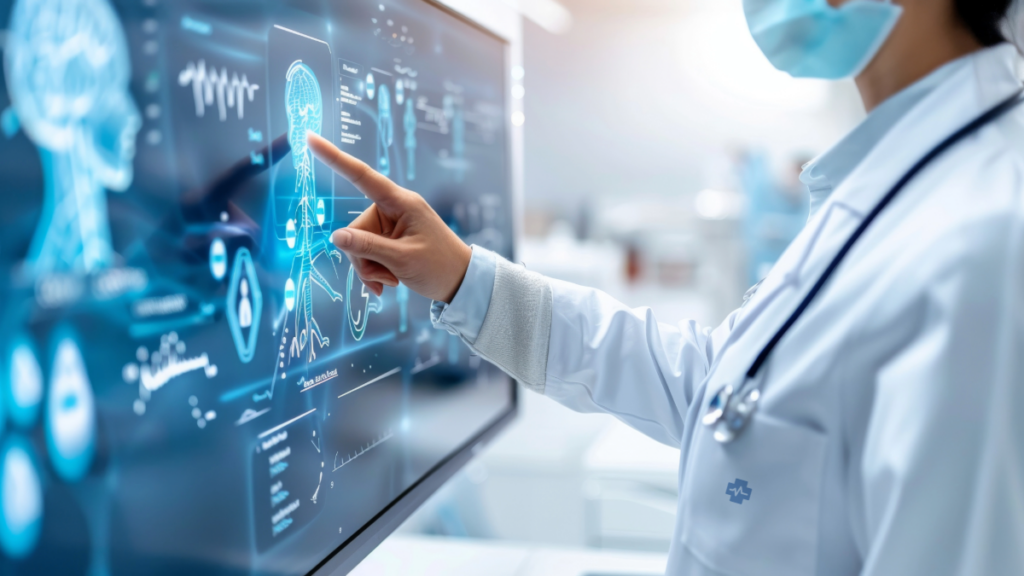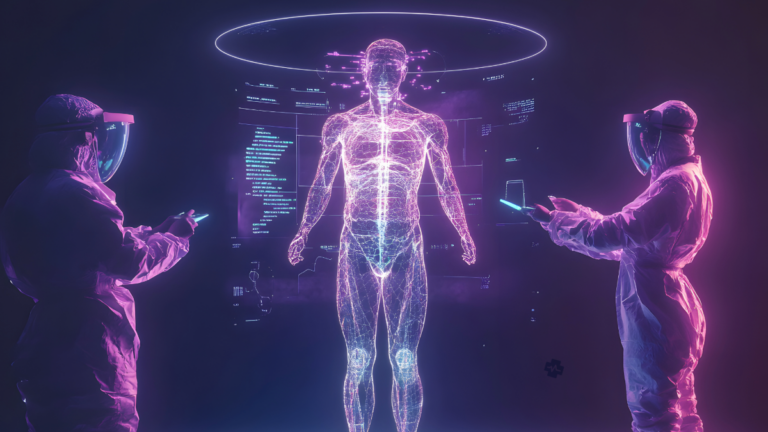Artificial Intelligence, or AI as we know it, wasn’t on the world’s radar when the Covid-19 pandemic rolled in. We simply didn’t think that computer technology could ever successfully give answers to some of medical science’s most compelling questions – ones which we as humans are unable to answer.
Yet, it seems AI has taken a central position in medical circles in just a few years. This is because it is able to process enormous amounts of data, quicker than a human professional can!
Data is fed into the intelligence system, and data is given out. This brilliant interplay of medical input and compelling, life-changing output has us questioning just how many limitations in medical science will be broken in months and years to come by AI.
AI algorithms are able to successfully analyse enormous quantities of medical data; and to then give reports based on these, which depict trends and patterns which humans are unable to see.
As such, the possibilities which AI holds for the field of health and medicine are limitless.
Concerns Over Misuse of AI
At the same time, there are genuine concerns about AI, and in the medical field, many of these centre around ethics and the misuse of AI. For example, professionals are concerned about the ramifications of exposing confidential patient information to AI. Will the patient’s integrity and confidentiality be honored?
How can medical professionals ensure this and what measures are currently in place to ensure ethics and AI go hand in hand into the future? If this doesn’t happen, the implications can be enormous.
One such area where concerns around medical ethics has been raised is the sharing of medical images with AI systems. Elon Musk had suggested people upload their medical test results, such as X-rays and CT scans, with a new AI chatbot, called Grok. The idea behind this proposal was to help Grok learn to read the test results. The suggestion was that Grok could become like a doctor, having learned from X-rays, PET scans and so forth, to become an expert in diagnosis and treatment feedback.
However, this input of personal medical information into databases hasn’t always worked in the past. There was the case of genetic company 23andMe, which asked people to send their DNA for ancestry determination. The company went bankrupt and wasn’t able to protect the privacy of those who submitted confidential medical information!
Ethics in AI Usage

So what steps have been put in place to protect medical confidentiality and integrity?
One of the ways safety and confidentiality can be enforced when sharing patient information with AI is to remove identifiers from the records. This means removing birth dates and patient names, for example.
Special tools called ‘anonymisation’ tools are suggested. These tools remove metadata from where it has been embedded into confidential medical images.
Data encryption is another method which ensures access to files and confidential medical information is sealed off from unscrupulous users. This is the kind of technology which is used to protect the confidentiality of Whatsapp and other messaging service messages, for example.
For the purpose of sharing medical records and information, it is suggested encrypting both stored data, as well as data that is ‘in transit’ – that is, data which is being sent.
Access control is another method which can prevent unauthorised persons from accessing medical records on AI systems. Such a method makes it possible only for certain people to upload, or even access or upload medical-related information or images.
The ‘cloud’ would be another area of concern, since this is universally accessible. One way medical information harnessed by AI could be protected, is for the AI system of a particular hospital or medical institution, for example, to be run on a local machine. This use of a ‘private cloud option’, would iron out any safety risks which might exist with Cloud-based AI models, which are accessible to absolutely everyone.
Popular Medical AI Software
| Software/Platform | Application Area | Description | Key Features | Company |
| Viz.ai | Diagnostics & Imaging (Neuro, Cardio) | AI-powered care coordination platform that analyzes medical images (CT, MRI, EKG) to detect critical conditions like stroke and cardiac events in real-time. | Automated detection and notification of suspected diseases, real-time communication tools for care teams, workflow integration, mobile accessibility. | Viz.ai |
| Qure.ai | Diagnostics & Imaging (Radiology) | AI solutions for automated interpretation of radiology exams (X-rays, CT scans, MRIs), detecting abnormalities and aiding in faster diagnosis. | Detection of various conditions (e.g., tuberculosis, lung nodules, fractures), triage capabilities, reporting and analytics, integration with PACS. | Qure.ai |
| PathAI | Diagnostics & Imaging (Pathology) | AI-powered platform for pathology, assisting pathologists in improving the accuracy and speed of cancer diagnosis through image analysis of tissue samples. | Automated detection of cancerous regions, quantification of biomarkers, workflow optimization tools, integration with laboratory information systems (LIS). | PathAI |
| Google Health/DeepMind | Diagnostics & Research | Developing AI models for various applications, including early detection of eye diseases (diabetic retinopathy), breast cancer screening, predicting patient outcomes, and analyzing medical images. | Focus on deep learning and large-scale data analysis, development of highly accurate diagnostic algorithms, research collaborations with hospitals and universities. | |
| IBM Watson Health | Clinical Decision Support, Research | AI platform designed to assist clinicians in making treatment decisions by analyzing patient data, medical literature, and treatment guidelines. Also used for drug discovery and research. | Analysis of complex medical data, personalized treatment recommendations, insights for research, natural language processing for understanding medical text. | IBM |
| Medtronic GI Genius | Diagnostics & Imaging (Endoscopy) | AI-powered intelligent endoscopy module that integrates with colonoscopy systems to help physicians identify colorectal polyps in real-time. | Real-time polyp detection with visual and audio alerts, assists in identifying subtle lesions that may be missed by the human eye. | Medtronic |
| DeepScribe | Workflow Optimization (Documentation) | AI-powered medical scribe that captures natural conversations between clinicians and patients and automatically generates medical documentation, integrating with EHR systems. | Ambient voice technology, real-time transcription and note generation, automated clinical coding suggestions, reduces administrative burden for clinicians. | DeepScribe |
| Abridge | Clinical Workflow & Patient Engagement | AI platform that transforms doctor-patient conversations into actionable insights, including summaries for patients and clinicians. | Automatic summarization of medical conversations, identification of key information, patient-friendly summaries to improve understanding and adherence. | Abridge |
| Aidoc | Diagnostics & Imaging (Radiology) | AI solutions for medical imaging, providing real-time alerts and analysis for a wide range of conditions, helping radiologists prioritize critical cases. | Detection of intracranial hemorrhage, large vessel occlusions, pulmonary embolism, and other critical findings, workflow integration, prioritization of urgent cases. | Aidoc |
| Annalise.ai | Diagnostics & Imaging (Radiology) | Comprehensive AI decision-support tools for medical imaging, capable of detecting a wide range of findings in CT scans and X-rays. | Detection of up to 130 findings in CT brain scans and 124 findings in chest X-rays, confidence scoring for findings, workflow integration. | Annalise.ai |
Building the Future of Medical Technology
There is definitely a need to place safe boundaries in AI applications. While AI systems are growing at phenomenal paces, ethics and moral standards do not change. These ethics need to be considered as a priority, to create a foundation on which to build tomorrow’s technologies.
With secure ethical and safety foundations in place, the medical profession can then trust the advancement of AI.
The patient should always come first; and in addition to successful diagnosis and treatment, protection of privacy is a part of this requirement.

